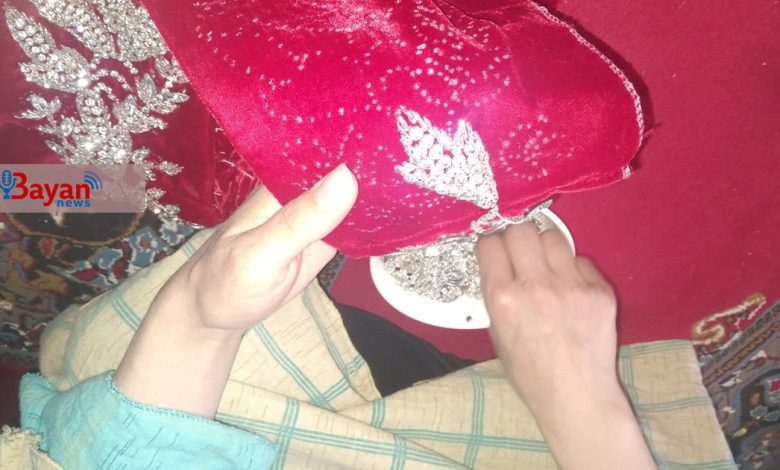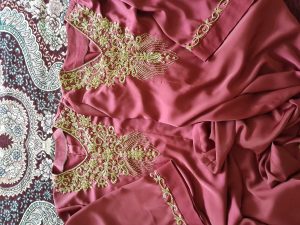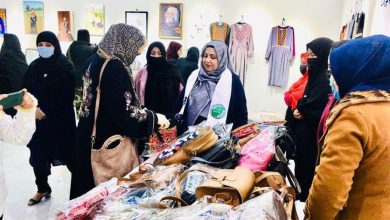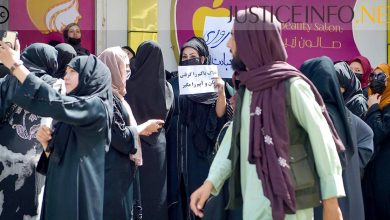
Embroidery Profession as an Alternative to Education
Karima Moradi
Bayan News – Zainab, a 24-year-old woman, aims to engage in embroidery alongside her 48-year-old mother, adorning green and white garments. Zainab’s mother has been practicing this occupation for years, sustaining the family’s economic cycle.
A correspondent from Bayan News reports on a family that has joined hands to combat current societal challenges, including poverty, economic difficulties, and government-imposed restrictions.
Every day, with the break of dawn, Zainab and her mother collect festive garments from the city’s tailors and embellish them with embroidered patterns. This has always been her mother’s routine, but now, in unexpected circumstances, Zainab accompanies her mother to provide financial support to the family and escape the monotony of daily life, employing her skillful fingers to stitch the green and white garments.
In a corner of the embroidery tools room, Zainab and her mother have thrown their anchor. Colorful beads of all kinds, ranging from red to various vibrant shades, can be found there. Both are occupied with sewing the clothes, which serve as their pastime during these days and help alleviate their sorrows.
The husband and the eldest son of this family are unemployed. Zainab’s husband was dismissed from work following a difficult operation he underwent three years ago. Their eldest son, who owned an art gallery, faced a downfall with the rise of the Islamic Emirate. He wishes to leave Iran, but what hinders him is the absence of a passport. Although he registered for it last year, he has yet to receive it.

Before the restrictions imposed by the Islamic Emirate, Zainab was preparing to teach in a private school to prepare for the university entrance exam. However, with the arrival of the Taliban, her professional and educational life abruptly changed. It seems that the wind has blown away all her aspirations, not only taking away Zainab’s dreams but burying the dreams of thousands of educated girls.
After the Taliban gained control, Zainab, who was somewhat ahead in education, lost her purpose. She tells Bayan News, “When the Taliban took over Afghanistan, the courses collapsed, and even the wealthiest families did not allow their daughters to attend courses. When the restrictions were imposed, the courses were completely closed.”
Zainab further expresses that after the closure of girls’ schools and educational centers, she became engulfed in despair and hopelessness. She no longer believes that she can help women and girls in this society through knowledge and education. “With the closure of schools and educational centers, I completely lost hope that I could assist my peers through my education.”
Although the imposed restrictions have put women and girls in difficult circumstances, Zainab and her mother have remained resilient. Zainab’s mother has experienced the rule of the Islamic Emirate in the past and speaks about the behaviors of that time.
According to Zainab’s mother, with the resurgence of the Islamic Emirate, the situation of women and girls will regress to 23 years ago, and her prediction has proven to be accurate. Therefore, she has taught Zainab how to showcase her art and pursue her desires through entrepreneurship if she is excluded from social and cultural spheres. Embroidery has now become a job for Zainab.
Zainab has become a fashion designer who accepts any design according to her clients’ preferences. She sketches her designs on plastic with a pen, then pierces it with a needle and applies a mixture of water and plastic paste to the fabric. The paste is applied in a dotted pattern on the fabric, and she follows the marked dots to deliver the customized garment according to the customer’s taste.
Zainab clearly states that embroidery requires a lot of effort and does not yield much profit. She says, “Although embroidery and sewing strain the eyes and don’t bring much income.”
Zainab’s mother also says that continuing this activity has caused physical damage and she has even faced back problems, which can be attributed to poverty and economic hardships that families are currently facing.
The bad economic times have forced Zainab and her mother to focus more on this job for income generation. This job has taken away Zainab’s opportunities for education and teaching, and now she works hard to earn a meager amount.
Zainab explicitly states that in the current circumstances, in order to earn a meager income and make ends meet, she has to pass by the Rustam bakery and be content with this job considering the circumstances.

Zainab learned this profession from her mother when she was in the 8th grade. She initially used her own clothes for embroidery and gradually learned professional designs and garment design.
According to Zainab, clothing stores have provided a platform for Zainab and her mother’s designs and embroidery. However, she has witnessed many times that the shopkeeper sells the embroidered clothes to customers as foreign hand-made items. She says, “My mother and I are very skilled in embroidery, but whenever we go to a clothing store, we realize that the shopkeeper sells the clothes to customers as Pakistani hand-made items.”
Difference in the behavior of the first and second rule of the Islamic Emirate
Masoumeh, who is Zainab’s mother, is 48 years old and remembers the first rule of the Islamic Emirate. Masoumeh says that women and girls were also confined to their homes during the first rule, and her lack of education is the result of the strict behaviors of the first Islamic Emirate that deprived women of all their rights and life privileges.
The Bayan News reporter explicitly asks Masoumeh about the difference between the first and second rule of the Islamic Emirate, whether the Taliban has changed or not.
In response to this question, Masoumeh states, “In the first period of the Taliban when we were there, education was not allowed. We had somewhat become accustomed to it, but in the second period, countries and the world have progressed so much, yet the Taliban does not allow girls to study or work. It doesn’t make any difference. In this day and age, the world has advanced so much, but our country does not allow women to pursue education.”
Masoumeh says that despite all the difficulties during the first and second rule of the Islamic Emirate, she has not given up the fight. Although she herself (Masoumeh) remained deprived of education during the first rule and now her daughters face the same fate as her, she is not allowed to benefit from her human rights.







